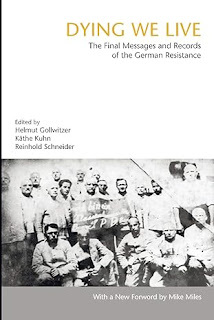Preview: 80th Anniversary of Blessed Rupert Mayer, SJ's Death
 Periodically, the Magnificat prayer monthly includes an excerpt from Dying We Live: The Final Messages and Records of the German Resistance, edited by Gollwitzer, Kuhn, and Schneider. After reading several of those excerpts, I purchased the 2009 Wipf and Stock edition. It is an extraordinary experience reading the letters and journals of these men and women, girls and boys as they face imprisonment, torture, and execution with tremendous peace and faith.
Periodically, the Magnificat prayer monthly includes an excerpt from Dying We Live: The Final Messages and Records of the German Resistance, edited by Gollwitzer, Kuhn, and Schneider. After reading several of those excerpts, I purchased the 2009 Wipf and Stock edition. It is an extraordinary experience reading the letters and journals of these men and women, girls and boys as they face imprisonment, torture, and execution with tremendous peace and faith. One of the last entries in a section titled "Crowned in Death" is by Blessed Rupert Mayer, SJ who died 80 years ago on All Saints Day in 1945.
So, on Monday, August 11, I'll highlight this anniversary in our weekly Son Rise Morning Show segment, as a way to recommend this book and remember his life and sacrifice. You know the drill: I'll be on the air around 7:50 a.m. Eastern/6:50 a.m. Central. Please listen live here or catch the podcast later here.
Rupert Mayer was born on January 23, 1876, in Stuttgart, Germany. Although he heard a call to become a Jesuit when quite young, he obeyed his father and went to college first, then studied for the priesthood. He was ordained in 1899 and joined the Society of Jesus in 1900. After studying in the Netherlands he was assigned to Munich in 1912 and then served as a chaplain during World War I. He was wounded and his left leg was amputated. After the war he returned to Munich.
As early as 1933 Father Mayer began to preach against Chancellor Adolf Hitler's actions against the Church from the pulpit of Saint Michael's, the Jesuit parish in Munich. He was told to stop such preaching and then taken into "protective custody" on June 5, 1937. He was arrested again on November 3, 1939 and taken to the Sachenhausen concentration work camp for political prisoners.
As this blog notes:
After a few months, his health had deteriorated so badly that it was feared he might die in the camp and be seen as a martyr. So he was sent to stay in the Benedictine abbey in Ettal [which this year is celebrating the 125th anniversary of its restoration after the suppression of the abbey in 1803], in the Bavarian Alps. Fr Mayer spent his time there in prayer, leaving his future in the Lord’s hands. He remained in the abbey for almost six years until freed by American forces in May, 1945.
He at once returned to Munich, where he received a hero’s welcome, and took up again his pastoral work at St Michael’s. However, the years in prison and the camp had undermined his health. On 1 Nov, 1945, Rupert was celebrant at the 8 a.m. Mass on the feast of All Saints in St Michael’s. He had just read the Gospel and began preaching on the Christian’s duty to imitate the saints, when he had a stroke and collapsed. Facing the congregation, "The Lord… the Lord… the Lord…" were his last words. He died shortly afterwards. He was 69 years old. While he was first buried in the Jesuit cemetery at the Jesuit house of studies in Pullach, outside Munich, his remains were later brought back to the city and interred in the crypt of the Burgersaal, the church next to St Michael’s, where the men’s Sodality regularly met.
Saint Michael's in Munich offers some details on his beatification:
Father Rupert Mayer was beatified by Pope John Paul II on 3 May 1987, during a service at Munich's Olympic Stadium. In his sermon, the pope told the congregation: "May the spiritual legacy of his life and apostolic ministry always be with you, especially in times of trial, and always give you new strength and confidence in Christ." After the service, the Pope visited Bürgersaalkirche, where he paused in silent prayer at the tomb of the Blessed.The Vatican website has the homily available in Italian and German. Pope Saint John Paul II beatified St. Teresa Benedicta of the Cross (Edith Stein) during that visit too. Father Rupert Mayer's feast day is November 3.
Father Mayer's selections in Dying We Live are from letters written during those different imprisonments, including at the monastery in Ettal--where he was not allowed to participate in the praying of the Divine Office by the monks per the authorities!--but kept hidden from the public entirely. That's how much the Nazi party feared him.
While he was in the penal prison at Stadelheim in June/July 1937, he wrote:
I have now passed through the most beautiful period of my life. One would not believe that possible. I have been happy, completely happy, as never before in my life. . . . (p. 257)Writing to a Gestapo official:
If people could only understand how little it takes to become truly happy inwardly! I have always known that God is good but that he is good in the degree that I have been permitted to experience during the past fortnight, I should never have thought possible. (p. 258)
The most difficult time for him was when he was moved to the monastery at Ettal because of the extreme isolation. He was moved there on August 6, 1940 (the Feast of the Transfiguration!):
Since I exist in a living death; indeed, this death is for me, who am still so full of life, much worse than actual death. . . . I intend to go on carrying my cross and to do penance and atone for my mistakes and my weaknesses, until such time as the dear Lord will intercede to lift this cross from me again. And likewise for the time to come, my watchword will be, "Nearer my God, to thee!" (pp. 262-263)
His favorite prayer was:
Lord, let happen whatever you will;and as you will, so will I walk;
help me only to know your will!
Lord, whenever you will, then is the time;
today and always.
Lord, whatever you will, I wish to accept,
and whatever you will for me is gain;
enough that I belong to you.
Lord, because you will it, it is right;
and because you will it, I have courage.
My heart rests safely in your hands!
So many of the letters and journals from these Christian victims of Nazi oppression echo these sentiments of resignation and rejoicing; confidence and hope: the main regrets their authors express are sorrow for their families, concern that their imprisonment, mistreatment--even torture--and deaths are causing great anguish to their parents, wives, children, brothers and sisters, friends, even fiancées.
Blessed Rupert Mayer, pray for us!



